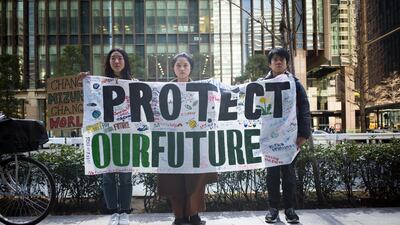The coronavirus pandemic has taken a steep toll on our current model of civilisation. Our measures to counter its spread and save human life are not without economic consequence. But as we are discovering, they have brought about respite to the natural environment. Photographs of smog-free metropolises, the rejuvenation of animal habitats and the return of greenery to our cities have instilled new confidence that humankind can heal much of the damage it has wrought on the environment over the last century.
In a research paper published earlier this month, Dr Thani Al Zeyoudi, the UAE Minister of Climate Change and Environment, referred to the Covid-19 pandemic as a “wake-up call” for “greater global collective action”.
There is a lesson in all of this for world leaders and companies: once the pandemic subsides, we must not go back to the status quo. As we reopen economies everywhere, we must take care to avoid the resurgence of what Dr Al Zeyoudi has described as “revenge pollution”.
According to the World Health Organisation, air pollution kills 7 million people every year. So far, the coronavirus has claimed over 330,000 lives and infected more than 5 million individuals. But it is not a necessary trade-off. World leaders have an opportunity to save lives from pollution and disease at the same time.
The worldwide reduction in pollution levels over the past few months has bolstered the case that this feat is possible, if concerted action is taken on a global scale. In planning for a post-coronavirus reality, governments must plan for a greener, more sustainable economy. This is an opportunity to begin anew and meet the UN-sponsored Sustainable Development Goals agreed upon by world leaders back in 2015 and targetted for 2030. Some of the characteristics of our new pandemic-era reality, such as the reduction of excessive air travel or support for local economies, can make a big difference in meeting the targets of the SDGs. Countries can increase "onshoring," as the research paper suggests, by bringing some operations previously outsourced overseas back home, lowering transport-related carbon emissions. Creating a more sustainable future is within reach but will require the same bold action seen in the last few months to curb the novel coronavirus.
In a recent majlis, Sheikh Mohamed bin Zayed, Crown Prince and Deputy Supreme Commander of the Armed Forces, said society must put an end to its "culture of excess," which includes food waste and over-consumption. Last month, the Abu Dhabi Investment Office announced an investment of $100 million in AgTech companies, as part of a plan to boost local agriculture and food security in the arid country. The move is expected to create hundreds of jobs in three years. Abu Dhabi-based AgTech start-up Pure Harvest Smart Farms, meanwhile, has secured an investment commitment of $100m to fund sustainable greenhouses in the Gulf.
While certain environmentally friendly policy initiatives, such as promoting the use public transportation and car-sharing, pose public health problems for now, policymakers can use this time to prepare for their eventual re-emergence. In the meantime, there are realistic measures that people and companies can implement to reduce their carbon footprint. As regulations and policies have had to shift to meet the challenge of Covid-19, new systems are being built. All sectors must ensure that these systems are more sustainable and durable for this generation and the ones to come.
Not every person or every sector can afford to play by the same rules, and employers and policymakers will need to bear this in mind. But if the overall goals – to act responsibly and to protect health and nature – are clear, then all parts of society will have a clear role to play in ushering in a more sustainable post-pandemic reality.


